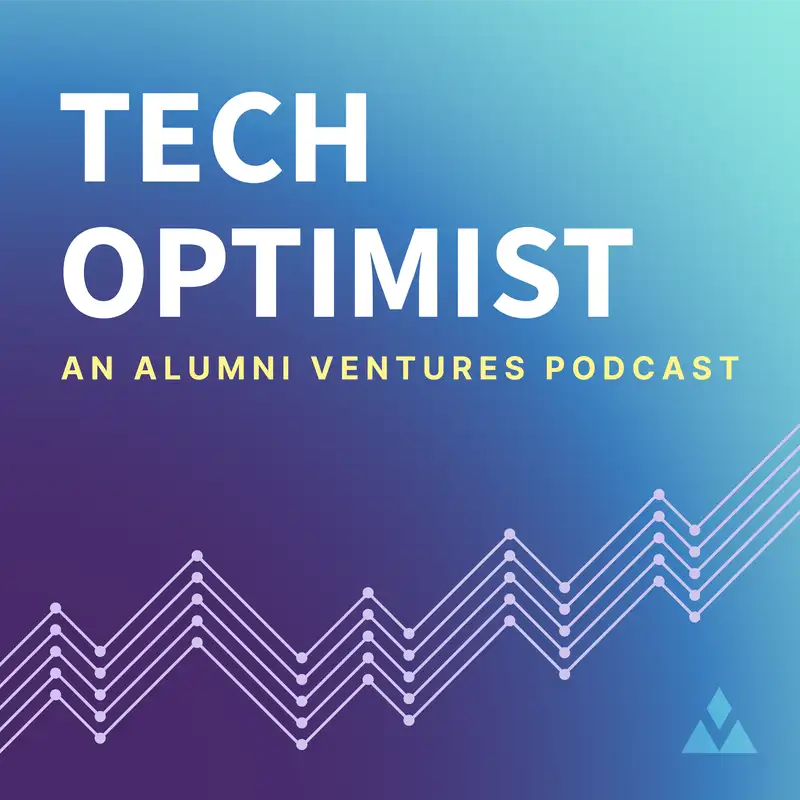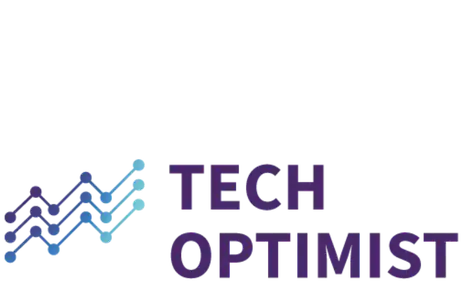#50 - Suing the FDA: GLP-1 Makers Using Chevron Ruling to Take On the FDA?
Sam:
Welcome to this very special 50th episode of the Tech Optimist. Today, we talk about suing the FDA, AI and climate policies, and how technology can affect mental health.
Mike Collins:
The precedent of the land. And you are going to see more and more of these kinds of, "Okay, we disagree on how you're ruling. We will see you in court." And so the federal government better gear up with its law staff.
Mike Perry:
I think there's a question, can AI help save the planet?
Mike Collins:
But it's honest, right? We're tech optimists, technology is powerful, but there is always unintended negative consequences of new technology.
Sam:
Hi everyone. Welcome back to this episode. This is a milestone for us. This is the 50th episode of the Tech Optimist. It's a really good one. Super excited to bring you along. So of course our speakers for today are going to be Mike Collins, founder and CEO at Alumni Ventures. And then his partner in crime for this span of Three Breakthroughs is Mike Peri, a partner at Alumni Ventures. And then you recognize my voice, my name is Sam. I'm the guide, editor, and just narrative savant for the show. So a little bit into the topics of today. First, the duo talk about suing the FDA, and how the company Eli Lilly has a pretty big problem with how GLP-1 drugs are classified within the FDA. So I sort of bring up concepts about the Chevron ruling from 1984 versus now, and Mike and Mike just talk about the future for any new companies that are going to be emerging in that space.
We also talk about how AI can analyze climate policies, and determine what is the most effective, kind of like a massive document reader and a policy understander that can put together the best policies versus the best ideas to get a perfect solution for different aspects of climate change. And then finally, we talk about a very real, very kind of daunting issue, which is how technology can affect mental health, and how social media can affect loneliness. So we sort of talk about the double-edged that is social media and marketing, and how people within this space can sort of help solve this problem. So I'll stop my yapping, welcome to the episode. Let's dive in. As a reminder, the Tech Optimist Podcast is for the informational purposes only. It is not personalized advice, and it is not an offer to buy or sell securities. For additional important details, please see the text description accompanying this episode
Mike Collins:
Yeah, and what else is going on. How's life?
Mike Perry:
Yeah, busy. End of summer, school's starting for our-
Mike Collins:
We did 14 deals. We did 14 deals last week.
Mike Perry:
Yeah.
Mike Collins:
Crazy.
Mike Perry:
We did a handful of those. It's been nice though. A little bit of a change. I think last year this time, we were doing a lot more seed. I think this time, the venture pipeline's opening up quite a bit for Series A, B and beyond. In addition to great seed. I think capital's only going to sit on the sideline for so long. No one's giving money back.
Mike Collins:
Yeah, and-
Mike Perry:
You have to invest.
Mike Collins:
... good companies are good companies, right?
Mike Perry:
Yeah, exactly. Regardless of what's going on.
Mike Collins:
Yeah, yeah. If I'm building a cool drug discovery company, I'm less concerned with the yen carry trade.
Mike Perry:
Yeah. You're still building your company.
Mike Collins:
You're still building your company, right?
Mike Perry:
It doesn't matter. Yeah.
Mike Collins:
All right. Mike, welcome. This week of Three Breakthroughs by Alumni Ventures. I'm here with my partner Mike Peri. I'm Mike Collins, the founder and CEO of Alumni Ventures. We're here like we do every week to talk about cool things going on in technology, Three Breakthroughs, and reasons to be optimistic about the future. So I'm going to kick it off this week with... I write these little notes, suing the FDA.
Mike Perry:
[inaudible 00:04:39] do it.
Mike Collins:
So the bigger story here is we all know about the Ozempic trade. That the GLP-1 family of drugs, which many of us believe are perhaps one of the most profound impacts on our society since antibiotics.
Mike Perry:
Yeah.
Mike Collins:
And so much of our culture is around poor food quality, sedentary lifestyle, which a lot of companies are willing to perpetuate, and then hand off the ball to the diabetes industrial complex. I have personal experience, life-changing for me. Lots of family, lots of coworkers are really finding really strong success here. And we've also talked a little bit about the pipeline, where we've gone from the single to the double. And now on the horizon, I think in phase II or phase III styles, Eli Lilly has a three agonist approach, retatrutide. I think I'm saying that right. And what the fight is and why Eli Lilly is now suing the FDA is the classification of that drug, right? And so basically, as you can imagine, Eli Lilly wants it classified as a certain class of drug that would give them 12 years of market exclusivity, before basically people can come in and sue them about their patent.
Mike Perry:
Yeah, exactly.
Mike Collins:
Versus five, right? Basically, is it a biologic or not? I think is the proper lingo. And another chance to talk about the continuing evolution of this class of drug in the pipeline, and the enormous amount of market cap that has been created by Novo Nordisk, which kind of with the first agonist drugs, and now with Eli Lilly with a more powerful second version. And then this one's in the pipeline along with other things is going to be competing for the space. And we're talking hundreds of billions of dollars, if not trillions in market cap potential here.
So this is very high stakes poker. The last number I saw was about 15 million or so Americans are on this drug, with a projected market size potential of a hundred to 150 million in the US alone. We're talking about a drug that is for most people or forever drug. So we're talking about a gold mine. I think the interesting thing, Mike, is I think this is an example of the Chevron ruling.
Mike Perry:
I was about to say it. I think that's where we're going.
Mike Collins:
Okay, let's talk about what this could mean. This could be a big deal what the Supreme Court has ruled.
Mike Perry:
Yep.
Sam:
Really quick, I'm going to butt in here. A quick reminder on the Chevron ruling that Mike and Mike are talking about. So first, some background. It initially was passed in 1984 through the Supreme Court. And the doctrine established a two-part test for courts to use when reviewing federal agency's interpretations of statutes. So if Congress has directly spoken on the issue, the court and agency must follow Congress's clear intent. And if the statute is ambiguous, this is the important part. The court should defer to the agency's interpretation as long as it is reasonable. So why this doctrine was so significant, it deferred to agencies. So it gave federal agencies substantial power to interpret ambiguous statutes they were tasked with administering. Expertise recognition. It acknowledges that agencies often have more technical expertise than courts in their specific areas of regulation and widespread application.
So the doctrine was applied in thousands of judicial decisions over four decades, becoming very deeply ingrained in the US legal system, and how we do things, how we decide things, how we make progress as a society, right? So why this is important. In June of this year, this ruling was overturned. So pretty much what that means is there's a shift in interpretive power. So now courts now have the sole authority to interpret statutes rather than deferring to these agencies. There could be increased scrutiny of agency actions, which could lead to more challenges in agency regulations and interpretations. There's potential regulatory uncertainty, so it may cast doubt on existing regulations that relied on board and other statutory language. This is an impact on future legislation. There's a potential increase in litigation, so regulated entities gain more leverage to challenge agency interpretations, and there may be a rise in legal challenges to agency actions.
So now why this was important and sort of why it was overturned. So it was overturned because it was a conflict with the Administrative Procedure Act or the APA. The court found that the Chevron difference was incompatible with the APA, which requires courts to decide all relevant questions of law, and interpret constitutional and statutory provisions. The justices ruled that courts must exercise an independent judgment in interpreting statutes rather than deferring to agency interpretations.
Now, this is important because it's mostly widely understood that these agencies that have this specific knowledge are the ones that should be trusted. So when that power goes back to the courts, it can change a lot, and it can change a lot about how the FDA falls into all of this. How these new emerging drug companies come up, and how they would develop their technology based on this overturning in the Supreme Court.
Mike Collins:
Is that the courts are really going to decide, unless it is explicitly done in legislation, we are going to move it to the courts to decide how broad of a reach do these regulatory bodies have. Like the EPA, FDA, SEC. And everybody was like, "Oh, yeah, academically I get it why that is different and interesting. And here's why I love it, and here's why I hate it." For me, this is like, "Here we go. This is an example."
Mike Perry:
I mean, it could be one of these mantle pieces for Chevron, right? You're looking at Eli, and you're saying, "Okay, we've spent decades researching this. If you look at how we evolved the pipeline of this drug, right? It was early days, diabetics are taking it. Oh, if we happen to tweak these things around the edges, all of a sudden, massive innovation for what the drug can do." Clearly, individuals flocking to it. You mentioned 15 million people and growing. The view's probably the same. If you're sitting there as a researcher at Eli Lilly saying, "Okay, here's the third iteration of it, third innovation, what else could it open up for us?" We should have the ability to have more of a proprietary defensibility in the long run. Because look at what we've done in the last two years. We've moved mountains for this.
Mike Collins:
Yeah.
Mike Perry:
So I could totally see this being a prime example of, "Okay, let's test the limits of what Chevron's really doing here."
Mike Collins:
Yeah. And we're talking about seven years in market with some form of reduced competition, where again if... And again, if you look at the results of this drug, even compared to the super effective versions that are in market, this is a step function even more powerful and effective for... And again, we're talking weight loss, but again, we are seeing these drugs impact secondary and tertiary benefits that are related to potential some inflammation diseases, brain issues related to addiction, related to cognitive decline, Parkinson's disease, there's testing going on.
Mike Perry:
It did work me up. I mean, I've been in and around healthcare for a while. There was so much press being put from, I think the payer perspective on like, "Oh, we're not hitting what we expected this quarter or our loss ratios are higher. And we're going to point our fingers to Ozempic." And it's just, in my mind, it's indicative of once again, not seeing through, is this actually used as preventative medicine? And you're going to catch up on the savings in the long run. These people are going to be healthier, less diabetic, all these issues that could be curtailed in the early days, but because they're just looking at it on a quarterly basis saying, "Oh, this is the cost driver right now."
Mike Collins:
It is triggering to me, where insurance companies are taking the posture of fighting this medicine. And I'm not talking about a 27-year-old trying to drop 10 pounds for some event. I'm talking about people that are clinically unhealthy by having a BMI of 27 or something.
Mike Perry:
Standards that the-
Mike Collins:
You should lose-
Mike Perry:
... health payers would agree with, right?
Mike Collins:
Yeah. That are well proven, that have huge comorbidities. That any reasonable person would say, "John Doe at a BMI of 23 is just a healthier human being than at 33." And insurance companies fighting that is just so indicative of a short-term mindset. As opposed to, this person is healthier and is actually going to consume less healthcare dollars.
Mike Perry:
No, I mean, it's-
Mike Collins:
It's crazy. It is crazy.
Mike Perry:
Take the same individual, right? Okay, now they're pre-diabetic, now they're diabetic. Instead of throwing more money in the early innings doing preventive lifestyle, all this, no, we rather pay for the leg amputation, when the-
Mike Collins:
Or the expense that we're going to put in, we need-
Mike Perry:
Off the rails. Yeah, exactly.
Mike Collins:
Yeah. So crazy. But this is Chevron, dollars to be had. We'll see you in court. And so again, and I'm not taking... To me, again, I deal with the rules of the hand. And Chevron, good, bad. It is now the precedent of the land, and you are going to see more and more of these kinds of, "Okay, we disagree on how you're ruling. We will see you in court." And so the federal government better gear up with its law staff.
Sam:
Okay, real quick, we're going to do an ad, and then we'll hop right back into this second breakthrough. Don't go anywhere.
Video:
Hi, just a brief interruption to introduce you to the Healthtech Fund from Alumni Ventures. Alumni Ventures is one of the most active and best performing VCs in the US, and we have raised over a billion dollars from more than 10,000 individual investors. With our Healthtech Fund, you'll have the opportunity to invest in a portfolio of around 20 healthtech startups. From transformative healthcare services to groundbreaking diagnostics, our founders are paving the way for a healthier future. To learn more, visit us at av.vc/funds/healthtech.
Mike Collins:
Okay. What do you got, Mike?
Mike Perry:
All right, well, speaking about government stuff, I want to talk a little bit about AI and legislation and policies. So I think there's a question, can AI help save the planet? I think we'd agree, yes.
Mike Collins:
Mm-hmm.
Mike Perry:
But what I was reading relates to the how, and it might actually be a bit surprising. So recent research suggests that you could leverage AI to analyze thousands of policies. So in this case, analyzing thousands of climate policies to identify which ones are actually effective at reducing carbon emissions. And what I really liked about it is it took some traditional statistical modeling, throwing on everything you can now do with AI. And these researchers, what they looked at is over 1,500 climate policies across 41 countries. And they identified 63 specific interventions that significantly cut carbon emissions. And in my mind, I think what's so significant about this is, they looked at multiple years, and they highlighted a couple examples that I thought were relevant, right?
In the UK, they wanted to phase out coal-fired power stations. And they were looking at why was this successful, because they had tried it historically. And it was like, well, it was only successful because you had a combination of a coal phase out policy, and a minimum carbon price policy. And when you put those two together, it actually really worked. Another example of this is in Norway. So they were one of the first to say, "We need to put a ban on combustion engines." And for a while, just unsuccessful. Okay, they paired it then with a strong price incentive that made electric vehicles much more affordable. Sure enough, what happened? Very efficient.
So I think this is just a specific use case looking at climate, but I think broadly speaking, a lot of these companies we're looking at, there might be a new category for AI to play here. Which is, analyzing hundreds of pages of legislation, and how people are trying to position things through to really say, "If you focus and find the right mix of policies, rather than just a quantity buckshot approach of this, you could actually really move the needle on a lot of core metrics." Climate being one of them. I mean, healthcare for sure, right?
Mike Collins:
Yeah, what works-
Mike Perry:
I thought it was an interesting use case. Yeah.
Mike Collins:
Yeah. What works, what doesn't? Where do you get the bang for your buck? The stuff that we and our portfolio companies are now using day to day, absolutely being applied to other kinds of organizations, governments, nonprofits. It is a great tool, and I'm starting to see it with very small nonprofit groups that don't have the resources to have an engineering department, or to have a data analytics department. The ability for state and local governments, the ability for small nonprofits, small religious organizations to do what they want to do better with this technology.
I was visiting family over the weekend, and one of the family members does some work in religious teaching. And I was just literally sitting with her and with ChatGPT, and just showing her... and with Gemini. And I'm just saying is like, "Okay, what are you trying to do?" And we went through some things that just would make her do what she wanted to do better, and she understood what she was good at and feedback she had been getting. So there were questions like, "How could I do this better? What would be an approach for me to teach this a different way? How can I make this more relevant to this type of person?" Yes, yes, yes.
Mike Perry:
I mean, yeah, that's a great use case. I mean, I just imagine a future, as someone who votes, right?
Mike Collins:
Yeah.
Mike Perry:
Where it's like, "Okay, I want our representatives to sit there and say, if I'm trying to push something great that helps entrepreneurs or moving healthcare forward, you should absolutely be using AI or some type of modeling to help you optimize your initiatives." And if you come with a really comprehensive view of, "Yes, our constituents wants this, here's what we believe, here's our hypothesis. And oh, by the way, we've used this model that says if you put these three things together, you're going to yield the best outcome for, I don't know, increasing access to rural communities in healthcare." If you can do that and you can start to communicate it to the broader public, I feel like people are going to have much more faith in-
Mike Collins:
No, and there's the layering, Mike, too, right? Because it's like, you're in the logic. You are in the, what is the best mix of policies? But then you can also use the tool to say, what are communication messages, and help me sell this message. That might appeal to people on a more emotional level than the analytical level, because that's how things get done too. But it can also be a tool to help you do that kind of stuff. And just a little bit of teasing, the rumor is that ChatGPT-5 or whatever they're going to call it, Strawberry things, is kind of now in testing, safety testing.
I think we could see something by Thanksgiving, which is kind of the next version of this. Which again gets the speed of improvement here, from 3, 3.5, 4.0. And the competitive play now between what you have with OpenAI, and Google, and Apple, and Microsoft, and Meta. And what we're even seeing from Nvidia, they're clash of the titans. All here in the United States, by the way. People who want to say, "This is not the technology hub of the universe," you're smoking dope. Because those companies are here, and they're kicking ass and taking names on this stuff.
Mike Perry:
Yeah.
Sam:
Okay. Last ad, and then we'll get back and we'll rock and roll.
Video:
Do you have a venture capital portfolio of cutting edge startups? Without one, you could be missing out on enormous value creation and a more diversified personal portfolio. Alumni Ventures, ranked at top 20 VC firm by CB Insights is the leading VC firm for individual investors. Believe in investing in innovation? Visit av.vc/foundation to get started.
Mike Collins:
Okay, so the last one.
Mike Perry:
Right, yeah. What do we have?
Mike Collins:
Yeah, the last one today, I'm going to call the loneliness fix, okay? So it's a bit of a downer, but it's honest, right?
Mike Perry:
Yeah.
Mike Collins:
We're tech optimists, technology is powerful, but there is always unintended consequences of new technology that then have to be fixed. And one of the things that has gone on that is troubling to all of us is lonely young people, and the feeling of lacking friends, lacking community, lacking tribes, a feeling that they belong. Again, just another tragedy this week in Atlanta with a troubled young person going violent. And you can kind of chart this with some of these technologies with the iPhones, and social media. And it's just not that, but there's a lot of dating apps. There's a lot of reasons where this is one of the things going on, is more people feeling lonely, not pairing up, not having close friends, not having a partner, not having groups that they feel they belong to. And they end up ending up belonging to sometimes not the most constructive tribes then. And with a lot of anger, and a lot of isolation, a lot of mental health issues.
Yes, there needs to be root cause work done, but there's all of the above need to being addressing this. And so obviously we identify this as a problem that entrepreneurs are now looking to fix. And I think there is some investment to be made by those of us in venture capital. Obviously we're investors in some mental health platforms. Clearly this is one that is a great positive use of technology, because you can pair a good solution with a need, where it doesn't have to be geographically the right person down the street.
So I think just this kind of online healthcare trend, online therapy. Companies like Wealthfront and SonderMind and others that are in... Better Health, all these kind of online healthcare mental health providers I think are one. Obviously there's the whole area of mental health apps that I think are doing good work. I think there's a lot of companies that are trying to innovate around creative new third places, where people can meet. People can feel a sense of belonging.
We were talking, I think the other day I was down in New York, and kind of running clubs and book organizations where people get together just to be with other people who are interested in running or in reading. A great sense of belonging. And again, I think we're seeing more kind of offline, online, hybrid communities being created, but I don't know, what are your thoughts on this kind of, how do we address loneliness and isolation?
Mike Perry:
Yeah, there's so many thoughts that go through my head as a young parent when you hear this devastating news way too frequently in the US. I think the parallels you're drawing to healthcare are that, right? I mean, we have a disease in this country as it relates to it. And just like many of the diseases we look at, there's going to be comorbidities. And I think if you look at this notion of loneliness, we can talk about policies on guns and all that another time. But if you get to the core of it, access and inclusion for things in healthcare, we've done a historically poor job of that. I think in the age of COVID, it really pushed it along.
Mike Collins:
Yep.
Mike Perry:
You're seeing a lot of these models find very interesting differentiated distribution, like models that work just for schools, or you're embedded somewhere else. And I think the challenge for us in the venture context is, anytime you see one of these businesses, you're like, best integrity known to man, "I want this thing to succeed and do as well as possible." Our hard part is, which one do we think really rises to the top? And my view, just one person's opinion, is going to be some of these solutions that think more broadly as it relates to the comorbidity effect here.
So yes, it's not maybe just access to a therapist, but it could be how do you find the inclusion of your community? How do you relate to certain other things where you can start to get out of your comfort zone and realize the thoughts you have aren't necessarily unique to you? That doesn't mean to minimize them, but there are avenues where you can go and you could explore this, and you could really work through it individually. There's so much to unpack here. But yes, at the core level, just identifying there is mental health needs, there are communication needs, and a lot of this stems from, "I feel like I have nowhere to go. I don't have anyone to talk to." We should make that a mandate in this country, no young individual ever feels as though they have nowhere to go. They have no one to speak to. That is a day one thing we have to solve, eradicate that to zero. No one should feel that way.
Mike Collins:
Yeah. And so much of our technology peers are a technology-only solution, right?
Mike Perry:
Mm-hmm.
Mike Collins:
And I think humans are still biological creatures. And in the same way we've talked, Mike, about kind of the magic of hardware and software, I tend to think addressing these issues is a combination of high-tech and high-touch.
Mike Perry:
Oh, yeah.
Mike Collins:
And again, it's not just the 25-year-old, isolated, angry, frustrated young man, but it is also my 86-year-old mother who lost her husband, and a lot of her friends now are a distance or dead. And how do you deal with loneliness among our elder population? What's the solution there, kind of thing? And so, again, I bring these things up just as, again, a kind of a call to arms of like, "Hey, entrepreneurs, other venture capitalists, let's have a prepared mind to look for really creative solutions that maybe combine high-tech, high-touch."
Mike Perry:
Yeah, that's the key. The model might look a little bit different than what you've historically invested in. And that's okay.
Mike Collins:
Yeah. And let's be open to that. Yeah.
Mike Perry:
At least at AV, you know this, Mike, I know this, our team knows that, that's okay, right?
Mike Collins:
Yeah.
Mike Perry:
It might have to look a little bit different, but it can be transformative in that way.
Mike Collins:
Yeah. At the end of the day, there's a big problem, and we need to find big solutions to those big problems, so.
Mike Perry:
Yeah.
Sam:
Okay, so for my little interjection here on this topic, I think I have a sort of special circumstance where I am in this demographic that Mike is talking about, right? Mid-20s, just in that sort of generational time where social media affects a lot of my life personally. And it is ingrained in the work that I do every day. It's ingrained in my social habits with friends and everything. So I'm going to provide a few more statistics on some negative aspects of social media. But then I want to try and round this episode off on a positive note as well.
But first, for the negative kind of downer stuff. Studies indicate that adolescents who spend more than three hours per day on social media are at a higher risk for experiencing mental health problems. 25% of teens reported feeling anxious, stressed, or even depressed after using social media. There's studies found of increased loneliness, like Mike is talking about here. Found that limiting social media use to 30 minutes per day resulted in a significant reduction in feelings of loneliness and depression. By contrast, heavy social media users are 2.7 times more likely to be lonely than those who use it less frequently.
There's also impacts of cyberbullying, and emotional harassment, and even physical harassment. There's even the concept of social media addiction. Where a survey found that 50% of teenagers feel addicted to their mobile devices, particularly for social media. And 72% feel the need to immediately respond to messages, which can interrupt daily activities and sleep patterns. The average daily time spent on social media worldwide is about two hours and 30 minutes. Excessive screen time has been linked to lower academic performance, sleep disturbances, and mental health issues.
The sleep one is pretty crazy. So poor sleep quality. Over 57% of adolescents report using social media in bed. And those who do so, are more likely to suffer from poor sleep quality. With studies showing that individuals who use social media before bed are 70% more likely to experience sleep problems. And then also a survey conducted by the Royal Society for Public Health found that one in five young people wakes up during the night to check messages on social media, contributing to chronic sleep deprivation, which negatively impacts mental health, academic performance, and just overall well-being.
But as far as a few positive statistics involved with social media use. With this, we're just trying to add a positive ending to this episode. We all acknowledge here at Tech Optimist and Alumni Ventures that this is generally a large problem, and then it all goes back to the core, which is the mental health issues and how social media, and just screen time affects all of this. And we definitely think there should be a call to action with some entrepreneurs and some problem solvers out there in the world. But social media does have its positive aspects of it as well. It's like a double-edged sword. So there's examples of business and brand growth, where brands get more exposure on social media. So 91% of marketers report that social media has improved their brand visibility, customer engagement. So brands that engage on social media, you see a 20 to 40% increase in customer engagement.
Lead generation. So social media platforms are used by 73% of marketers to promote their services. Sales growth, social media presence experience a 30% higher conversion rate. There's community building aspects on social media. So over 70% of people use social media to connect with friends or communities. 81% of teens report that social media helps them feel more connected to their friends' lives, and provides a sort of difference as a community. 50% of adults use social media for learning purposes such as learning groups or educational videos. There's empowerment to creators, all those content creators and creativity.
So 50 million people globally identify as creators on platforms like YouTube, TikTok, and Instagram. 79% of people say user-generated content on social media influences their purchasing decisions, highlighting the power of creative expression, this global awareness, and social change. So under activism and advocacy, social media has been a catalyst for social change with 64% of people saying they have participated in a cause or movement because of information they saw on social media. Disaster response. In times of crisis, social media plays a vital role with over 50% of users using platforms to access real-time updates and contribute to relief efforts.
So social media when used strategically and thoughtfully, offers numerous opportunities for personal, professional growth, community building, and advocacy. Again, there are those long-term negative effects of social media as well. So my sort of singular opinion is that if there are people in this society that can understand the positive effects of social media and online community building, to then sort of help understand or combat the overarching issue of the long-term negative effects, then I think would be in a good spot.
Mike Collins:
But first of all, you have to recognize the problem, and even then want to solve it. And so, again, three good ones again this week. Mike?
Mike Perry:
Yes.
Mike Collins:
I think you got one more week, and then it's like we're going to pass the baton.
Mike Perry:
Yeah, hopefully I'm leaving big shoes to fill, so that's always the goal. All right, Mike, have a great weekend. Talk to you. Bye.
Sam:
Thanks again for tuning into the Tech Optimist. If you enjoyed this episode, we'd really appreciate it if you'd give us a rating on whichever podcast app you're using. And remember to subscribe to keep up with each episode. The Tech Optimist welcomes any questions, comments, or segment suggestions. So please email us at info@techoptimist.vc with any of those, and be sure to visit our website at av.vc. As always, keep building.







